Zoellazaborski
On this page, you find all documents, package deals, and flashcards offered by seller zoellazaborski.
- 15
- 0
- 0
Community
- Followers
- Following
1 Reviews received
15 items

The Seeing Brain (and Agnosia)
These lecture notes look at whether faces are special, and whether humans can make assumptions of a face based on specific features. Agnosia is the loss of ability to recognize objects and there are many different forms of it, including Apperceptive and Associative Agnosia among others, which are explained in these lecture notes. The case of FB and CK are explained, as well as other research.
- Class notes
- • 0 pages •
These lecture notes look at whether faces are special, and whether humans can make assumptions of a face based on specific features. Agnosia is the loss of ability to recognize objects and there are many different forms of it, including Apperceptive and Associative Agnosia among others, which are explained in these lecture notes. The case of FB and CK are explained, as well as other research.
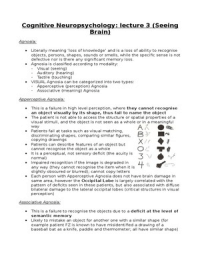
The Seeing Brain (and Agnosia)
These lecture notes looks at all the different types of Agnosia, which is a loss of ability to recognise objects. It also looks at whether faces are special or not, and how humans make these distinctions.
- Class notes
- • 5 pages •
These lecture notes looks at all the different types of Agnosia, which is a loss of ability to recognise objects. It also looks at whether faces are special or not, and how humans make these distinctions.
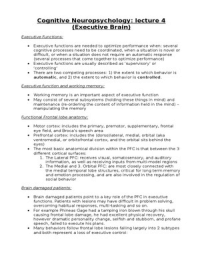
The Executive Brain (and Working Memory)
Executive functions are needed to optimize performance when: several cognitive processes need to be coordinated, when a situation is novel or difficult, or when a situation does not require an automatic response (several processes that come together to optimize performance) Executive functions are usually described as ‘supervisory’ or ‘controlling’ There are two competing processes: 1) the extent to which behavior is automatic, and 2) the extent to which behavior is controlled. These le...
- Class notes
- • 6 pages •
Executive functions are needed to optimize performance when: several cognitive processes need to be coordinated, when a situation is novel or difficult, or when a situation does not require an automatic response (several processes that come together to optimize performance) Executive functions are usually described as ‘supervisory’ or ‘controlling’ There are two competing processes: 1) the extent to which behavior is automatic, and 2) the extent to which behavior is controlled. These le...
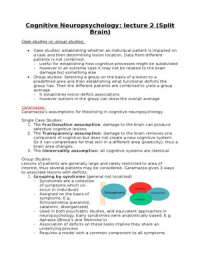
Split Brain (Neuroimaging)
These lecture notes looks at group and case studies, in light of Caramazza's work (assumptions, his argument, and objections to his argument). It also describes the different techniques of functional neuroimaging, including fMRI and EEG. Computational modeling and animal studies are also explained, as they help to inform our knowledge of abnormal brains. Other syndromes are described, as well as Roger Sperry's work (1981) and the case of LB.
- Class notes
- • 5 pages •
These lecture notes looks at group and case studies, in light of Caramazza's work (assumptions, his argument, and objections to his argument). It also describes the different techniques of functional neuroimaging, including fMRI and EEG. Computational modeling and animal studies are also explained, as they help to inform our knowledge of abnormal brains. Other syndromes are described, as well as Roger Sperry's work (1981) and the case of LB.
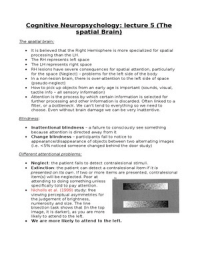
The Spatial Brain (and Blindness)
These lecture notes look at neglect and extinction in terms of different attentional problems. Feature integration Theory and Baliant's syndrome is also explained, with case studies and research to back up the theories
- Class notes
- • 5 pages •
These lecture notes look at neglect and extinction in terms of different attentional problems. Feature integration Theory and Baliant's syndrome is also explained, with case studies and research to back up the theories
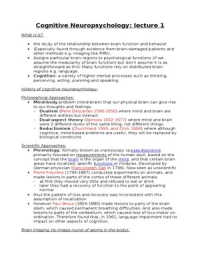
Introduction to Neuropsychology
This introduction lecture explains what Neuopsychology is, and it looks at the approaches and assumptions in Neuropsychology, and explains the terminology used in textbooks and articles.
- Class notes
- • 5 pages •
This introduction lecture explains what Neuopsychology is, and it looks at the approaches and assumptions in Neuropsychology, and explains the terminology used in textbooks and articles.
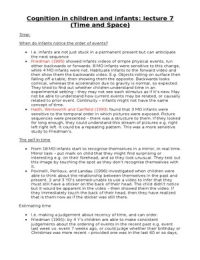
Time and Space
When do infants notice the order of events? Do they see themselves in space and time? They use spatial reasoning with language From a very early age, infants show ability to encode space allocentrically, egocentrically and in relation to landmarks
- Class notes
- • 4 pages •
When do infants notice the order of events? Do they see themselves in space and time? They use spatial reasoning with language From a very early age, infants show ability to encode space allocentrically, egocentrically and in relation to landmarks
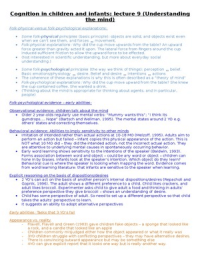
Understanding the mind
• Some folk-physical principles (basic principle): objects are solid, and objects exist even when we can’t see them, and forces movement. • Folk-physical explanations: Why did the cup move upwards from the table? An upward force greater than gravity acted it upon. The lateral force from fingers around the cup induced sufficient friction to allow the upward force to be effected. • (Not interested in scientific understanding, but more about everyday social understanding.) • Some fo...
- Class notes
- • 3 pages •
• Some folk-physical principles (basic principle): objects are solid, and objects exist even when we can’t see them, and forces movement. • Folk-physical explanations: Why did the cup move upwards from the table? An upward force greater than gravity acted it upon. The lateral force from fingers around the cup induced sufficient friction to allow the upward force to be effected. • (Not interested in scientific understanding, but more about everyday social understanding.) • Some fo...
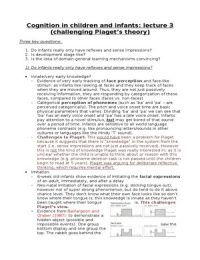
Challenging Piaget's theory
Do infants really only have reflexes and sense impressions? Is development stage-like? ( objections to this theory) Is the idea of domain-general learning mechanisms convincing?
- Class notes
- • 4 pages •
Do infants really only have reflexes and sense impressions? Is development stage-like? ( objections to this theory) Is the idea of domain-general learning mechanisms convincing?
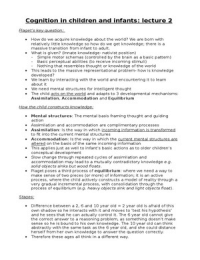
Piaget's theory
How do we acquire knowledge about the world? We are born with relatively little knowledge so how do we get knowledge; there is a massive transition from infant to adult. The child acts on the world and adapts to 3 developmental mechanisms: Assimilation, Accommodation and Equilibrium This lecture gives information about how human infants acquire knowledge in light of Piaget's theory with the 4 stages of development
- Class notes
- • 4 pages •
How do we acquire knowledge about the world? We are born with relatively little knowledge so how do we get knowledge; there is a massive transition from infant to adult. The child acts on the world and adapts to 3 developmental mechanisms: Assimilation, Accommodation and Equilibrium This lecture gives information about how human infants acquire knowledge in light of Piaget's theory with the 4 stages of development

The Spatial Brain (and Blindness)